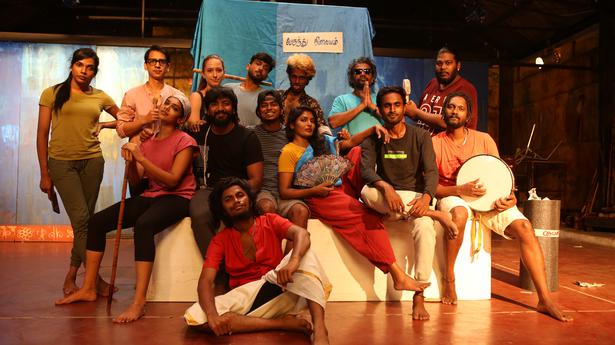
‘Natchathiram Nagargirathu’ movie review: Perhaps Pa Ranjith’s best, despite being too long
The Hindu
This is Ranjith’s finest and purest film, till date. Not just in terms of what it stands for but also the form with which it presents. This visual language is a departure for the filmmaker too
Lovers in bed having a seemingly thoughtful yet uneasy conversation about their relationship shouldn’t ideally remind you of that unbroken shot in Jean-Luc Godard’s seminal Contempt. Yet, that is what the smashing opening sequence of Pa Ranjith’s Natchathiram Nagargirathu does to you. There is contempt here too, just that it takes a different form: a casteist remark.
Rene (Dushara Vijayan. She is the best Pa Ranjith protagonist) and Iniyan (Kalidas Jayaram in an effective performance) have a heated discussion over Ilaiyaraaja’s music. Their difference in personalities establishes their political beliefs and where they would like to stand: Iniyan, a fan of Nina Simone, is dismissive of the maestro, while Rene says that Ilaiyaraaja is as superior as the American singer-activist. If not, more.
Iniyan gets “triggered” by Rene’s rendition of ‘En Vaanile’ from Johnny — a film that dealt with impersonation and identity crisis, and a woman living a caged life — and asks her to stop. Look at the choice of the song. It is political too. Iniyan cuts her off when Rene sings this line: “Neerodai polave en penmai. Neerada vandhathae en menmai.” This “ penmai” and “ menmai” wonderfully segues into Rene’s arc later, where she talks about a shadow called caste that made her run all through life but also empowered her to be fearless and assertive. “That’s my social identity,” she says. We will get there in a bit.
If you think this scene is a harmless argument over music, you are wrong. Rene (her birth name is Tamizh) is Dalit and she is made to realise this by Iniyan. The very nature of this scene is political and reminded me of the terrific short film Modi & A Beer, also produced by Neelam Productions. Rene and Iniyan break up, and the title card “A Pa Ranjith film” appears. Love is political.
The first half hour leading to Tenma’s energetic ‘Rangarattinam’ song is so delicately written and spaced out that it can be taken as a solid example to understand why a film needs to have a great set-up. Ranjith did this previously with Sarpatta Parambarai, where its first half hour was laboriously spent to establish its world. But this film also takes a long time to arrive at its first escalation point. Subeer (Regin Rose), mentor of a movement theatre group, comes up with the idea of a play on love. They discuss love, its politics and facets that turn into a heated discussion showing people’s true colours. What are the different kinds of love? Inter-caste? Inter-faith? Queer love? Unrequited love? Natchathiram… is all that.
By making an inclusive cinema, with a diverse set of voices with varying gender, sexual and political identities, Ranjith illustrates the point that the oppressed class of one can also become a dominant voice in another. This is evident in the scene where a character puts the blame on an upper-caste name which gets muted. And Dayana (Sumeeth Borana), a queer person, gets worked up. Dayana is still a minority and constantly faces the threat of oppression for his sexual orientation. But that doesn’t seem to remove the privilege of his caste. Therefore, the film questions the foundations of beliefs and prejudices that are hypocritical. For instance, a character shoots down love that is based on physical attraction, calling it “ gaaji” (lust). But the same person asks for a selfie from his potential partner, when she tells him she just had a shower. Or when Shekar (Charles Vinoth) says, “Love has nothing to do with age.”
Of course, it begins as romance between two characters. But soon, we realise it is not about Rene and Iniyan. We get the bigger picture. It is about a movement theatre group which they are a part of. In essence, their “love” story becomes a component of a larger thing. This is a masterstroke by Ranjith. The theatre backdrop, where people of different colours and social backgrounds converge to become one, is used as a springboard to picture society as a whole. Therefore, the characters’ imperfections and political consciousness become vital in this labour of love. The fact that all characters are treated as components, that they become a force to reckon with only when they unite in the face of threat, drives home Natchathiram Nagargirathu’s core principle: “The universe is so large that we are just thugal (particles),” says a character in the film.





















 Run 3 Space | Play Space Running Game
Run 3 Space | Play Space Running Game Traffic Jam 3D | Online Racing Game
Traffic Jam 3D | Online Racing Game Duck Hunt | Play Old Classic Game
Duck Hunt | Play Old Classic Game











